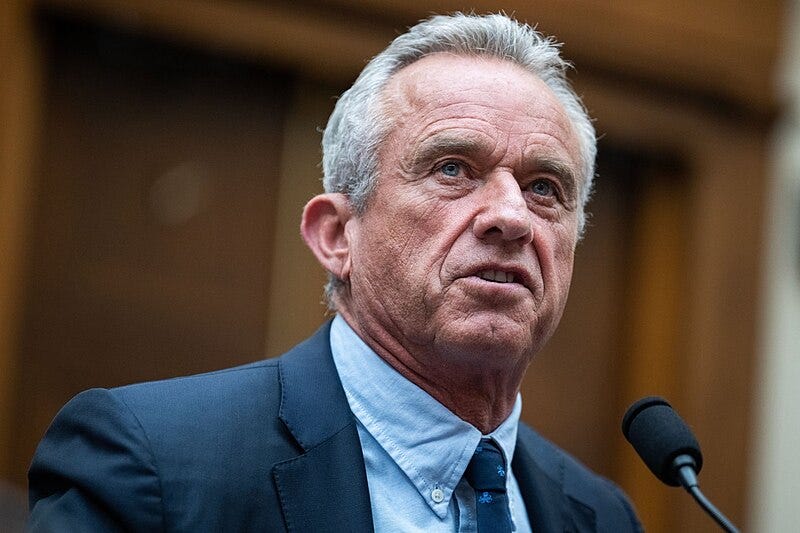One Step Back For Free Speech: RFK’s Supreme Court Fight Explored
By Adam Garrie, The Kennedy Beacon
By Adam Garrie, The Kennedy Beacon
On December 11, the Supreme Court refused to grant Robert F. Kennedy Jr. his Motion to Intervene in the matter of Murthy v. Missouri, a cause often referred to by the name under which it was originally filed, Missouri v. Biden. While the landmark free speech case will still be heard by the Supreme Court in 2024, Kennedy will not be included as a party in the appeal.
What The Case is About
The lawsuit alleges that the the Biden administration actively coerced and colluded with major social media companies to suppress the online speech of Americans that is protected by the First Amendment. In a significant Independence Day ruling, District Judge Terry A. Doughty found that the Biden administration violated the First Amendment by coercing social media companies into censoring the speech of Americans, including that of Kennedy whose name features heavily in the evidence brought before the court. Doughty issued a wide ranging injunction prohibiting the Biden administration from any further contact with social media companies regarding user content, with the exceptions of content relating to criminal allegations, threats to national security and content that constitutes potential foreign originated attempts at election interference.
The Biden administration appealed Judge Doughty’s ruling to the US Court of Appeals for the Fifth Circuit. Here, judges upheld the majority of Doughty’s ruling while narrowing the scope of Doughty’s injunction due to fears that it could restrict legally permitted government communications on social media. Crucially, the Fifth Circuit judges wrote:
Ultimately, we find the district court did not err in determining that several officials - namely the White House, the Surgeon General, the CDC, and the FBI - likely coerced or significantly encouraged social-media platforms to moderate content, rendering those decisions state actions In doing so, the officials likely violated the First Amendment.
The Biden Administration appealed the Fifth Circuit’s decision to the Supreme Court. The Supreme Court agreed to hear the matter and stayed (paused) enforcement of the injunction prohibiting federally coerced censorship, pending its decision in the matter which is expected in 2024. This means that the Biden administration is not currently restricted from contacting social media companies with coercive censorship requests.
Why Kennedy Sought to Intervene
Kennedy formally filed a Motion to Intervene in October. In doing so, Kennedy sought to be officially included as a party in the case. This is relevant for reasons pertaining to legal technicalities, election integrity and Kennedy’s publicly stated allegations that he has been harmed by the White House directed censorship detailed as evidence in Murthy v. Missouri.
Legal representatives of the Biden administration will argue before the Supreme Court, that the attorneys general of Missouri and Louisiana have no standing in a case involving matters of federal government directed censorship of American citizens on social media platforms. Typically, in order to have ‘standing’ in a legal matter, a litigant must convince a court that he, she or it has been harmed by the alleged behavior of a defendant. The Biden administration contends that this does not apply to the states of Missouri or Louisiana.

Mr. Kennedy contends that he has been actually harmed through the unambiguous censorship of his content across multiple social media platforms including Google-owned YouTube, Meta’s social media platforms as well as on the platform formerly known as Twitter and now known as X (prior to its acquisition by Tesla CEO Elon Musk in October of 2022). Thus Kennedy’s inclusion to the case would add a party with clear standing in the matter, as argued by Kennedy in his briefs to the court.
Kennedy has further argued that the harm caused to him by government directed censorship of his social media pages and profiles constitutes a specific harm to his constitutional right to run in the 2024 presidential election. According to Kennedy’s legal representatives, the candidate’s speeches and interviews continue to be subject to censorship. His counsel added “Mr. Kennedy’s unique interests as a presidential candidate - and the interests of millions of Americans who wish to hear his views - are of vital importance to the constitutionality of the Government’s censorship campaign.”
Thus, Kennedy sought to intervene in the case to give it a better chance of defeating a technical argument to be advanced by the Biden administration and also to ensure the integrity of the 2024 presidential election, which would be infringed if the free expression of a candidate is restricted through government ordered censorship.
Justice Alito’s Dissent
Although the majority of Supreme Court Justices who ruled against Kennedy’s Motion to Intervene did not explain their rationale, Justice Samuel Alito offered a dissenting opinion. Alito agreed that Kennedy’s intervention in the case is vital to his presidential campaign receiving fair treatment in the digital public square. According to Alito, “the denial of intervention is likely to prevent Mr. Kennedy from vindicating the rights he claims until the spring of 2024 and perhaps as late as June of that year. And by that time, several months of the Presidential campaign will have passed.”
Alito also agreed that Kennedy’s intervention in the case would assure that the litigants have standing, thereby rendering moot the major technical argument to be advanced by the Biden administration. Alito further stated,
Our democratic form of government is undermined if Government officials prevent a candidate for high office from communicating with voters, and such efforts are especially dangerous when the officials engaging in such conduct are answerable to a rival candidate. I would allow him to intervene to ensure that we can reach the merits of respondents’ claims and to prevent the irreparable loss of his First Amendment rights.
Supreme Court’s Historic Decision
Although Kennedy will not be a party to the case, the Supreme Court will nevertheless render a final decision on the important question of whether the Biden administration's coercion of and collusion with social media companies constituted a violation of the First Amendment. Prior to the filing of the lawsuit and the information from the Twitter Files which inspired the legal action, advocates for the suppression of free speech often advanced the argument that because social media platforms are privately owned, they have no obligation to protect free speech in accordance with the First Amendment.
The evidence in Murthy v. Missouri, however, demonstrates that the Biden administration was actively involved in the decisions to censor the free speech of Americans, often against the will of some social media executives. This is at the heart of the matter that will be decided by the Supreme Court. Will the court agree with Judge Doughty and find that government coercion of private companies in the pursuit of censorship is a violation of the First Amendment, or will it agree with the Biden administration that it is legally allowed to pursue censorship as a matter of public policy?

Freedom on Trial
There is a great deal at stake in the Supreme Court’s forthcoming decision which transcends the specifics of the case. The Kennedy Beacon recently published a piece detailing how the advent of the “censorship industrial complex” predates the phenomenon of COVID-19 and that its earliest partisans were concerned with suppressing populist politics, rather than supposedly promoting public health.This means that if the Supreme Court rules in favor of the Biden administration’s appeal, censorship is likely to become much more pervasive.
Election integrity is also at stake. If a candidate in a presidential election continues to be censored, this would constitute a matter of election interference far more profound than the censorship of the infamous Hunter Biden laptop story prior to the 2020 election. This is the case because while that involved the censorship of information relating to the contents of one man’s hard drive and cloud, Kennedy faces the prospect of being made persona non grata in an election that will likely see him running directly against a sitting president whose administration is accused of masterminding these censorship efforts.
Finally, there is a question of America’s identity. Is America still a country where people can say whatever they wish so long as it is peaceful in intent and implication? Or alternatively, will America succumb to the tyrannical tendencies of governments around the world that silence dissent as a matter of routine policy? These questions will have to be answered by both the Supreme Court and more poignantly, by the American electorate in November of 2024.
Adam Garrie is a writer, speaker and consultant on a wide range of current affairs as well as political risk. He is also the co-founder of HiCyrus, a data-driven tech start-up that aims to fully democratize information access.








Excellent article and summary of Murthy v. Missouri. Disappointing that RFK, Jr., was not included as a party in the appeal.
Thank you for this clear explanation; I had not been able to understand what this ruling meant by reading other articles about it, but now I think I get it. Thanks again!